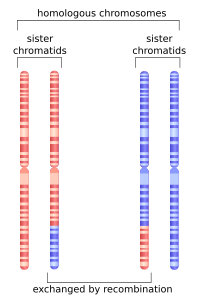
Photo from wikipedia
Mitogenomes of most flowering plants evolve slowly in sequence, but rapidly in structure. The rearrangements in structure are mainly caused by repeat-mediated recombination. However, patterns of repeat-mediated recombination vary substantially… Click to show full abstract
Mitogenomes of most flowering plants evolve slowly in sequence, but rapidly in structure. The rearrangements in structure are mainly caused by repeat-mediated recombination. However, patterns of repeat-mediated recombination vary substantially among plants, and to provide a comprehensive picture, characterization of repeat-mediated recombination should extend to more plant species, including parasitic plants with a distinct heterotrophic lifestyle. Here we assembled the mitogenome of the holoparasitic plant Aeginetia indica (Orobanchaceae) using Illumina sequencing reads. The mitogenome was assembled into a circular chromosome of 420,362 bp, 18,734 bp longer than that of another individual of A. indica which was assembled before as a linear molecule. Synteny analysis between the two mitogenomes revealed numerous rearrangements, unique regions of each individual and 0.2% sequence divergence in their syntenic regions. The A. indica mitogenome contains a gene content typical of flowering plants (33 protein-coding, 3 rRNA, and 17 tRNA genes). Repetitive sequences >30 bp in size totals 57,060 bp, representing 13.6% of the mitogenome. We examined recombination mediated by repeats >100 bp in size and found highly active recombination for all the repeats, including a very large repeat of ~16 kb. Recombination between these repeats can form much smaller subgenomic circular chromosomes, which may lead to rapid replication of mitochondrial DNA and thus be advantageous for A. indica with a parasitic lifestyle. In addition, unlike some other parasitic plants, A. indica shows no evidence for horizontal gene transfer of protein-coding genes in its mitogenome.
Journal Title: Frontiers in Plant Science
Year Published: 2022
Link to full text (if available)
Share on Social Media: Sign Up to like & get
recommendations!